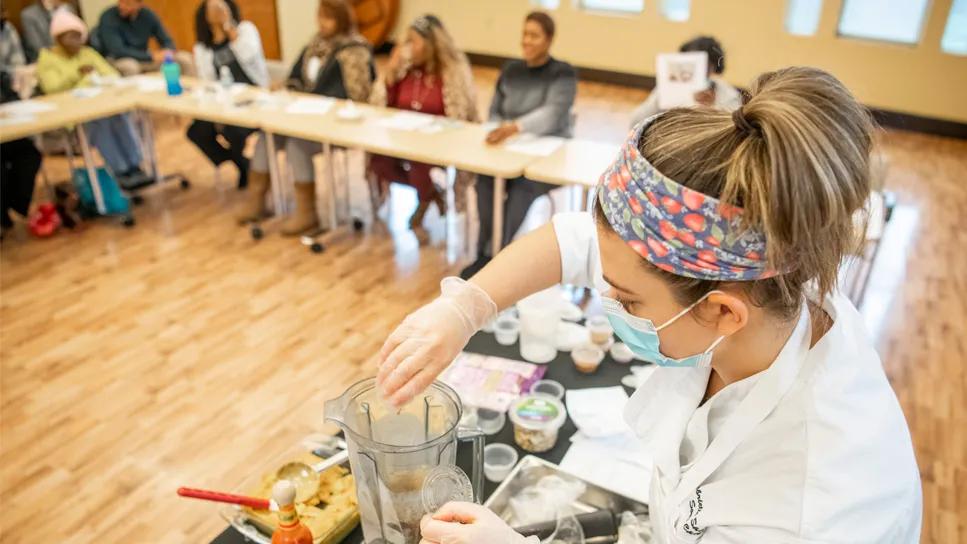Combining mind, body and lifestyle practices in alignment with conventional cancer treatment

Image content: This image is available to view online.
View image online (https://assets.clevelandclinic.org/transform/2f36e10f-0772-48d7-b3bb-975b5145c086/integrative-oncology-chef-class)
Interactive culinary medicine class
Many patients with cancer face a therapeutic burden that negatively impacts their quality of life. This sometimes makes it challenging to continue cancer therapy. For certain types of cancer, treatment-related nausea, changes in taste or problems swallowing, for example, can lead to malnutrition, putting patients further at risk.
There are multiple studies demonstrating that the addition of supportive care such as nutrition advice, exercise, acupressure and acupuncture can alleviate chemotherapy-induced nausea, vomiting, fatigue and other symptoms. The Integrative Oncology Program at Cleveland Clinic Cancer Institute provides patient-centered cancer care that uses mind and body practices and lifestyle modifications alongside traditional cancer treatments.
“Our approach is to focus on the whole person, not just their physical symptoms, to promote optimal cancer outcomes and improve patients’ quality of life,” says Naoki Umeda, MD, a specialist in the Center for Integrative Medicine.
Advertisement
Cleveland Clinic is a non-profit academic medical center. Advertising on our site helps support our mission. We do not endorse non-Cleveland Clinic products or services. Policy
Integrative oncology practitioners educate and support families impacted by cancer, teaching patients and caregivers ways to employ nutrition, stress reduction, vitamins and supplements as well as body work such as massage and acupuncture throughout their journey. “We want to offer patients an opportunity to be an active participant in designing their supportive care plan to help them have the best cancer care experience and outcomes possible,” explains Laura Shoemaker, DO, chair of the Department of Palliative and Supportive Care. “Our team ensures that integrative therapies are evidence informed and are aligned with cancer therapies the patient is receiving.”
Integrative oncology throughout the trajectory of their illness, including:
• Working with patients during their course of cancer treatment to help reduce side effects of chemotherapy, immunotherapy or radiation
• Providing lifestyle medicine support as patients move into survivorship
“People are living longer, and, in some cases, cancer actually becomes a chronic disease, thanks to advances in therapies,” says Dr. Shoemaker. “However, even once someone completes therapy, there is a burden that cancer-directed therapies may have taken. Integrative oncology can help reduce this suffering.”
Unlike “alternative” medicine, which is not validated by science and is not a part of standard medical care, integrative oncology involves evidence-based care, which helps ensure that supportive care services recommended to patients are safe and effective. Integrative oncology practitioners work closely with each patient’s oncology team to ensure any supportive care services offered are in alignment with their prescribed cancer-directed treatment plan.
Integrative oncology serves as an extension of the patient’s oncology team to help patients navigate the many questions that arise about ways to improve their health during and after cancer treatment. “There is so much confusing information out there online,” says Dr. Umeda. “Our goal is to work comprehensively with the patient and their care team to address all their needs and to ensure that any modality being used does not interfere with their cancer treatment.”
Advertisement
There are many supportive services available at Cleveland Clinic’s downtown location, regional centers as well as virtually, such as:
• Interactive culinary medicine classes taught by a chef from the Center for Integrative and Lifestyle Medicine and nutritionists from Taussig Cancer Institute, highlighting creative ways to prepare healthy foods and to address meal planning obstacles like treatment-related taste changes
• A pilot project introducing patients to acupuncture during infusions, helping people become comfortable with this practice and how it may alleviate treatment-related symptoms
• Full acupuncture sessions to help reduce pain, anxiety, nausea and other symptoms
• Physical rehabilitation and “prehabilitation” to help patients optimize their physical condition before, during and after surgery or other treatments
• One-on-one sessions with a licensed dietician to help ensure patients have the ideal intake of proper nutrients
• Stress-relieving practices such as yoga, massage, meditation and mindfulness
Any member of the care team can refer patients to the Integrative Oncology Program. Comprehensive program information is available in the Patient Resource Center at the Taussig Cancer Building on the main campus (phone: 216-445-2273).
Hear our recent podcast about integrative oncology.
Advertisement
Advertisement
Program enhances cooperation between traditional and non-pharmacologic care
Clinical trials and de-escalation strategies
Combination therapy improves outcomes, but lobular patients still do worse overall than ductal counterparts
Bringing empathy and evidence-based practice to addiction medicine
Supplemental screening for dense breasts
Combining advanced imaging with targeted therapy in prostate cancer and neuroendocrine tumors
Early results show strong clinical benefit rates
The shifting role of cell therapy and steroids in the relapsed/refractory setting